2022-2023学年外研版英语八年级上册Module1 How to learn English Unit1课件(共28张PPT内嵌音频)
文档属性
| 名称 | 2022-2023学年外研版英语八年级上册Module1 How to learn English Unit1课件(共28张PPT内嵌音频) | 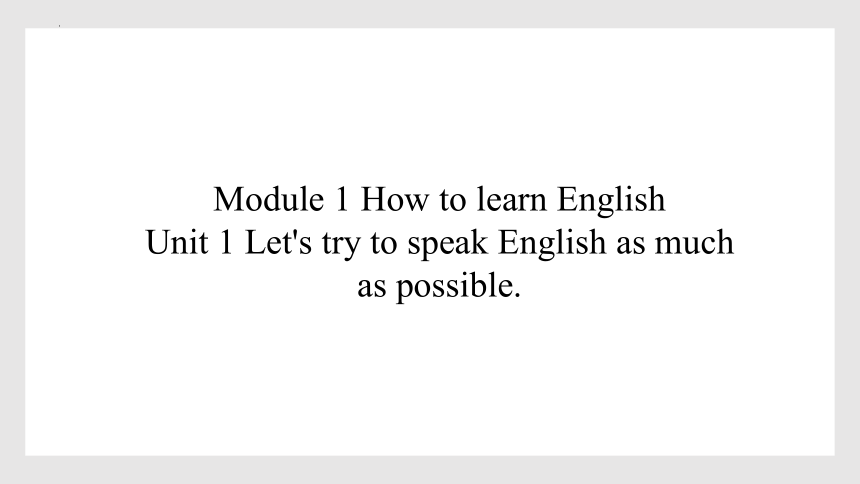 | |
| 格式 | zip | ||
| 文件大小 | 20.1MB | ||
| 资源类型 | 教案 | ||
| 版本资源 | 外研版 | ||
| 科目 | 英语 | ||
| 更新时间 | 2022-09-13 20:18:41 | ||
图片预览


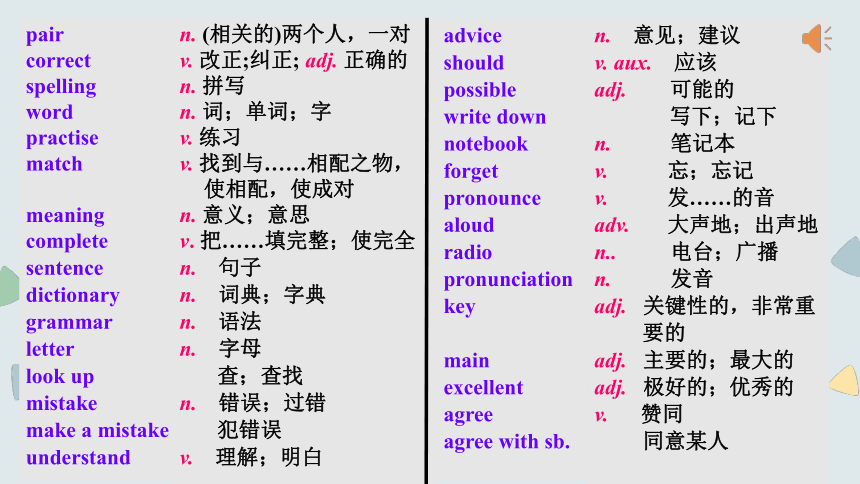
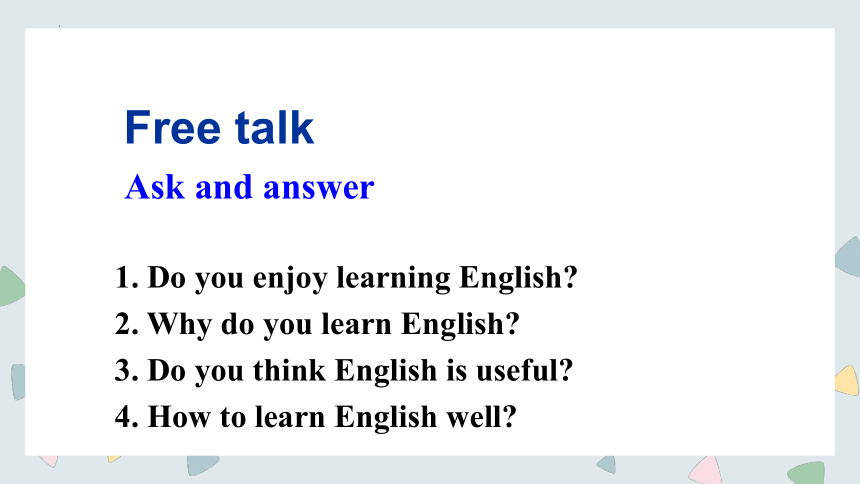
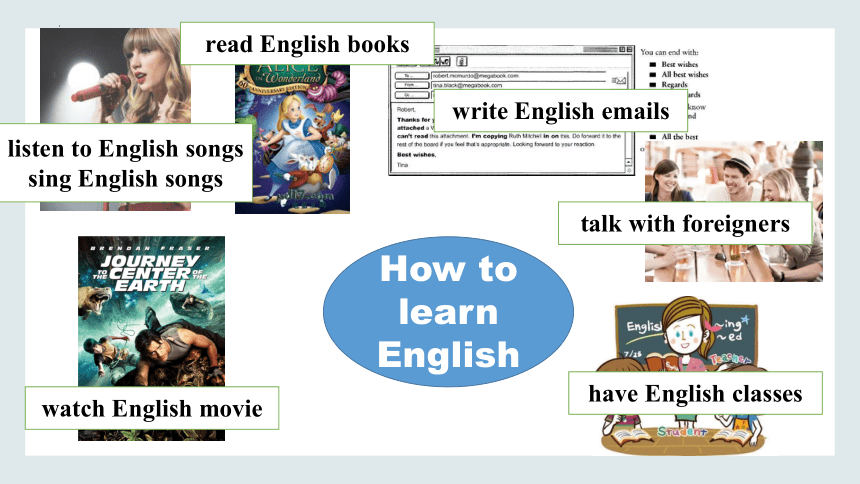
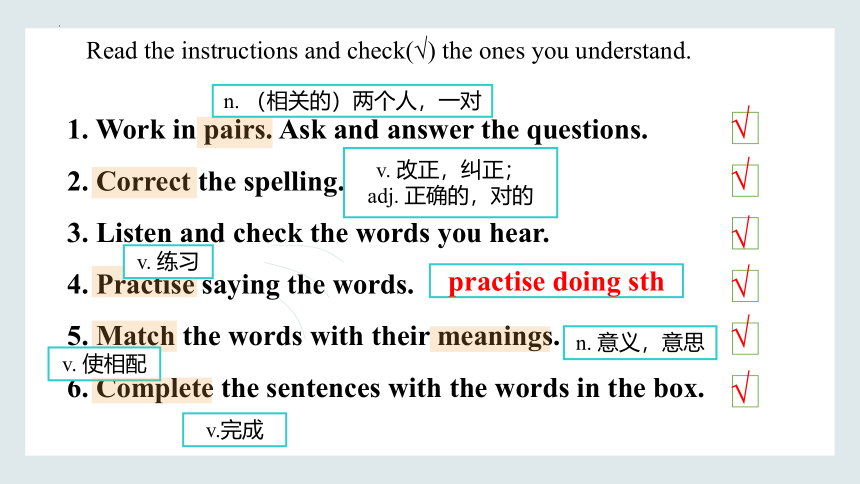
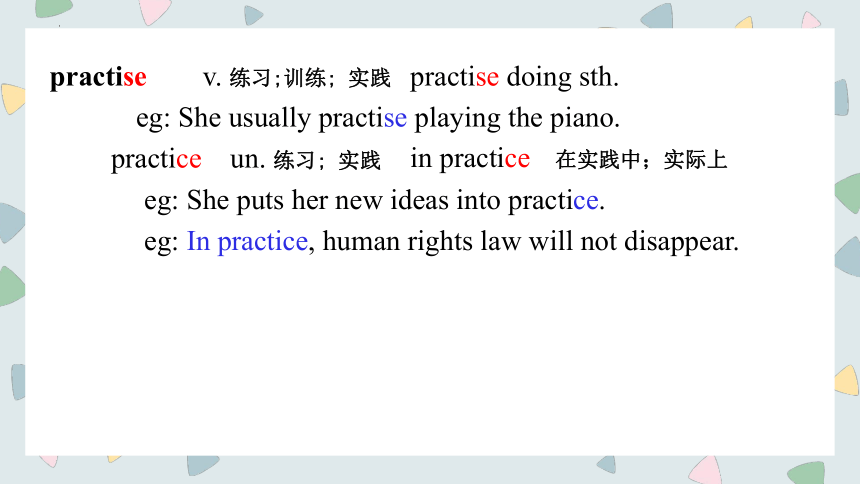
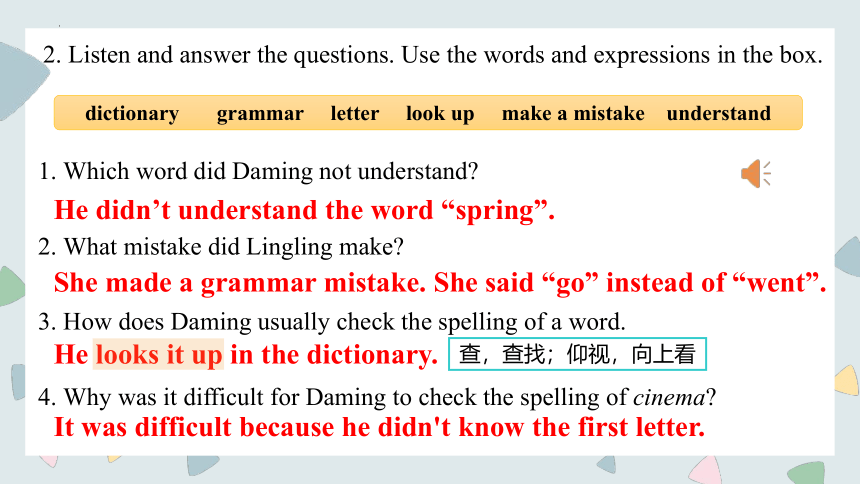
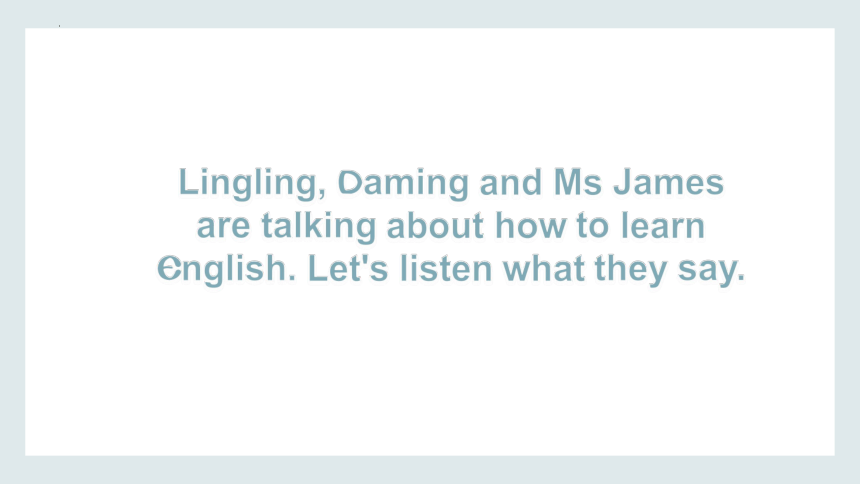
文档简介
(共28张PPT)
Module 1 How to learn English
Unit 1 Let's try to speak English as much as possible.
Welcome back to school.
advice
should
possible
write down
notebook
forget
pronounce
aloud
radio
pronunciation
key
main
excellent
agree
agree with sb.
n. 意见;建议
v. aux. 应该
adj. 可能的
写下;记下
n. 笔记本
v. 忘;忘记
v. 发……的音
adv. 大声地;出声地
n.. 电台;广播
n. 发音
adj. 关键性的,非常重
要的
adj. 主要的;最大的
adj. 极好的;优秀的
v. 赞同
同意某人
pair
correct
spelling
word
practise
match
meaning
complete
sentence
dictionary
grammar
letter
look up
mistake
make a mistake
understand
n. (相关的)两个人,一对
v. 改正;纠正; adj. 正确的
n. 拼写
n. 词;单词;字
v. 练习
v. 找到与……相配之物,使相配,使成对
n. 意义;意思
v. 把……填完整;使完全
n. 句子
n. 词典;字典
n. 语法
n. 字母
查;查找
n. 错误;过错
犯错误
v. 理解;明白
1. Do you enjoy learning English
2. Why do you learn English
3. Do you think English is useful
4. How to learn English well
Ask and answer
Free talk
How to learn English
watch English movie
listen to English songs
sing English songs
read English books
write English emails
talk with foreigners
have English classes
在此输入您的标题
Read the instructions and check(√) the ones you understand.
1. Work in pairs. Ask and answer the questions.
2. Correct the spelling.
3. Listen and check the words you hear.
4. Practise saying the words.
5. Match the words with their meanings.
6. Complete the sentences with the words in the box.
n. (相关的)两个人,一对
v. 改正,纠正;
adj. 正确的,对的
v. 练习
practise doing sth
v. 使相配
n. 意义,意思
v.完成
√
√
√
√
√
√
v. 练习;训练; 实践
practise doing sth.
eg: She usually practise playing the piano.
practice un. 练习; 实践
eg: She puts her new ideas into practice.
in practice 在实践中;实际上
eg: In practice, human rights law will not disappear.
practise
2. Listen and answer the questions. Use the words and expressions in the box.
dictionary grammar letter look up make a mistake understand
1. Which word did Daming not understand
2. What mistake did Lingling make
3. How does Daming usually check the spelling of a word.
4. Why was it difficult for Daming to check the spelling of cinema
He didn’t understand the word “spring”.
She made a grammar mistake. She said “go” instead of “went”.
He looks it up in the dictionary.
It was difficult because he didn't know the first letter.
查,查找;仰视,向上看
Lingling, Daming and Ms James are talking about how to learn English. Let's listen what they say.
Listen and read.
Ms. James: Welcome back, everyone! Today, we're going to talk about good ways to learn
English. Ready Who has some advice
Lingling: We should always speak English in class.
Ms James: Good!Let’s try to speak English as much as possible.
Daming: Why not write down our mistakes in our notebooks
Ms James: That’s a good idea. And don’t forget to write down the correct answers next to
the mistakes. What else
Lingling: It’s a good idea to spell and pronounce new words aloud every day.
Ms James: Thanks a lot, Lingling. How about listening to the radio
Daming: Yes, that’s good for our pronunciation too. But there are so many new words.
Ms James: You don't need to understand every word. You just need to listen for key words
and main ideas.
Daming: That’s the same for reading. English stories are so interesting. I get to know a lot
about the world through reading.
Lingling: I think writing is also important. Why don’t we try to find some English pen
friends We can write to them.
Ms James: Excellent!I agree with you.
=good ways of doing sth. 做某事的好方法
un
一条建议
向某人寻求意见
给某人建议
采纳某人的意见
拒绝某人的意见
a piece of advice
give sb advice
take/follow sb's advice
refuse sb's advice
ask sb for advice
should+do 应该做某事
否:should’t+do
n 错误,过错 by mistake
make a mistake/mistakes
correct the mistake
错误地
犯错误,出错
纠错
agree with sb/sth
agree to do sth
agree on/upon sth
agree that +句子
赞同sb/sth
同意做sth
就sth达成一致
同意
They agree with us.
He agreed to go with us.
Did you agree on the date
We all agree that the plan is perfect.
the key to... ..的关键
Listen and read.
Ms. James: Welcome back, everyone! Today, we're going to talk about good ways to learn
English. Ready Who has some advice
Lingling: We should always speak English in class.
Ms James: Good!Let’s try to speak English as much as possible.
Daming: Why not write down our mistakes in our notebooks
Ms James: That’s a good idea. And don’t forget to write down the correct answers next to
the mistakes. What else
Lingling: It’s a good idea to spell and pronounce new words aloud every day.
Ms James: Thanks a lot, Lingling. How about listening to the radio
Daming: Yes, that’s good for our pronunciation too. But there are so many new words.
Ms James: You don't need to understand every word. You just need to listen for key words
and main ideas.
Daming: That’s the same for reading. English stories are so interesting. I get to know a lot
about the world through reading.
Lingling: I think writing is also important. Why don’t we try to find some English pen
friends We can write to them.
Ms James: Excellent!I agree with you.
3. Listen and fill in the blanks.
Listening - listen to the (1)______
Speaking
Reading - read English (5)________
Writing
Learning new words
always speak (2)_______ in (3) _______.
speak English as (4)_______ as possible.
find some English (6) ____ _______,
and (7) ________ to them.
(8) ______ and (9) __________ new
words (10)_______ every day.
radio
English
class
much
stories
pen friends
write
spell
pronounce
aloud
Task 3
1. Underline the correct words and expressions.
Here is my (1) advice / notebook on learning English. Speak English (2) always / as much as possible in class, and listen to English (3) in the newspaper / on the radio. I (4) agree / forget it is a good idea to look up new words in the (5) notebook / dictionary. You can find the (6) correct / excellent pronunciation and learn the meaning.
Exercises
一、翻译下列短语:
1.犯错
2.写下
3.同意某人
4.给某人一些建议
5.为何不做某事
6.让我们一起做某事
make a mistake
write down
agree with sb.
give sb. some advice
why not do sth.
let’s do sth.
7.好主意
8.不要忘记去做某事
9.正确的答案
10.别的什么事
11.好主意去做某事
That’s a good idea
don’t forget to do sth.
the correct answers
What else
It’s a good idea to do
12.听收音机
13.和...一样重要
listen to the radio
as important as
一、用方框中所给单词的适当形式填空
pronounce spell speak mean learn
1. Can you tell me the _____________ of the new word
2. Mr Green told me some good ways ________________ a foriegn language.
3. If you want to learn English well, you'd better practise _______________ it as much as possible.
4. - Do you know the _______________ of the word “map”
- Yes. M-A-P.
5. Listening to the tapes every day is good for your _____________________.
v v v v v
n
tell sb to do sth
to do
practise doing sth
v-ing
n
n
meaning
to learn
spelling
pronunciation
speaking
二、单项选择
1. Did the policeman give much ____ on how to protect personal information
A. note B. tip C. advice D. book
2. - ______ did you see in the room - Nothing.
A. What else B. Who else C. What other D. Who other
3. The teacher is already standing here. Do you know when she ____.
A. comes B. came C. is coming D. was coming
4. There are so many new words in this lesson. I will ____.
A. write down them B. write it down
C. write down it D. write them down
5. Write ________ and try not to make any mistakes.
A. as carefully as you can B. as careful as possible
C. more careful D. so carefully as possible
Language points
1. Let’s try to speak English as much as possible. 让我们尽可能地多说英语。
2)as much as possible 尽量,尽最大努力(可能)
as...as possible = as...as sb can 尽可能多的……
You must try to be more careful. 你可要多加小心。
I tried gardening but didn't succeed.我试着种果木花卉,但未成功。
You should rest as much as possible. 你应当尽量多休息。
I will help you as much as I can. 我将会尽我所能地帮助你。
1) try to do sth. 努力做某事
try doing sth. 试着做某事
Language points
2. Why not write down our mistakes in our notebooks
你为什么不把错误记在笔记本上?
1.Why not… 意为“为什么不… ”, not后面接动词原形。
2.What/How about… “…怎么样 ”, 后接名词/代词/动词-ing形式作宾语。
在英语中,我们可以用多种表达方式提出建议或征求对方的意见。如:
3.Let’s…意为“咱们…吧”。let 后面的宾语如果是代词, 应用宾格形式, 后接动词原形。
(1) Why not do sth =Why don’t you/we do sth 是典型的表示建议的句型。
4.try (not) to do… 意为“ 尽量( 不) 做…”。
5.sb should do sth 意为“ 某人应该做……”。
6.It’s a good idea to…意为“……是个好主意”。例如:
① Why not ask your teacher the questions
③ Let’s look at the books.
⑤ You should take a walk after supper.
② What about having some cakes
④ Try not to read in the sun.
⑥ It’s a good idea to take photos here.
1. Shall we/I … 我们去...好吗?
Shall we go boating 我们去划船好吗?
2. Would you like sth./to do sth. 你想要/做...吗?
Would you like to go fishing 你想去钓鱼吗?
对这些建议的肯定回答可以是OK./Good idea. /All right.等。
否定回答可以是No, let’s… / Sorry. 或 I want to but…等。
此外, 用于提出建议的还有下面两种句型:
(2) write down 写下,记下,=put down. 是个 “动-副短语”
代词作宾语时, 代词只能放在write和down之间。
Write them down, please.请把它们记下来。
Please write down your name.=Please write your name down.
请写下你的名字。
类似的动副短语:
put on 穿上 take away 拿走
turn on 打开 ring up 给……打电话
turn off 关上 take off 脱下
当名词作宾语时, 可以在 down 之前,也可以在 down 之后。
3. And don’t forget to write down the correct answers next to the mistakes.
不要忘记把正确的答案写在错误旁。
2)correct 有两种词性
用作形容词时,意为“正确的,无误的”
I forgot bringing my books here.我忘记把书带到这里了。(实际上我已经把书带到这里了。)
I forgot to close the windows. 我忘记关窗户了。(我没有关窗户。)
I’m not sure of the correct spelling. 我拿不准拼写是否正确。
1) forget to do 表忘了应该去做某事
forget doing 表忘记过去已经做过某事
用作动词时,意为“改正,纠正”
Correct my pronunciation if it’s wrong. 如果我的发音错了,请予以纠正。
4. What else 还有别的什么吗?
What’s that in your other hand 你的另一只手里拿着什么?
else修饰不定代词、疑问代词或疑问副词,必须位于这些词之后。
other修饰名词,位于名词之前。
Where else did you go 你还去了别的什么地方?
other, else 都有 “别的,其他的” 之意。
它们的区别是:
5. It’s a good idea to spell and pronounce new words aloud.
大声拼读出新单词是个好主意。
It is + 形容词+of/for sb. to do sth
当adj是描述不定式行为者的性格或品质的形容词, 如 kind, good, nice, right, wrong, clever, careless, polite, foolish等时用 of sb。
类似的句型:
It’s very kind of you to help me. 你能帮我真好。
1)本句中的it是形式主语,真正的主语是动词不定式to spell and pronounce new words aloud 。
当adj是描述事物的形容词,如difficult, easy, hard, important, dangerous, (im)possible等时用for sb.。
It’s difficult for us to finish the work.对我们来说,完成这项工作很困难。
aloud 强调发出的声音能被听见,“出声地,大声地”,常与read/laugh/cry/call等动词连用。
loudly 含有喧闹的意思,“响亮地,大声地”。
2) aloud adv 大声地、出声地
The pain made her cry aloud. 她痛得叫起来
Don’t speak loudly in public places. 不要在公共场所大声喧哗
THANKS
Module 1 How to learn English
Unit 1 Let's try to speak English as much as possible.
Welcome back to school.
advice
should
possible
write down
notebook
forget
pronounce
aloud
radio
pronunciation
key
main
excellent
agree
agree with sb.
n. 意见;建议
v. aux. 应该
adj. 可能的
写下;记下
n. 笔记本
v. 忘;忘记
v. 发……的音
adv. 大声地;出声地
n.. 电台;广播
n. 发音
adj. 关键性的,非常重
要的
adj. 主要的;最大的
adj. 极好的;优秀的
v. 赞同
同意某人
pair
correct
spelling
word
practise
match
meaning
complete
sentence
dictionary
grammar
letter
look up
mistake
make a mistake
understand
n. (相关的)两个人,一对
v. 改正;纠正; adj. 正确的
n. 拼写
n. 词;单词;字
v. 练习
v. 找到与……相配之物,使相配,使成对
n. 意义;意思
v. 把……填完整;使完全
n. 句子
n. 词典;字典
n. 语法
n. 字母
查;查找
n. 错误;过错
犯错误
v. 理解;明白
1. Do you enjoy learning English
2. Why do you learn English
3. Do you think English is useful
4. How to learn English well
Ask and answer
Free talk
How to learn English
watch English movie
listen to English songs
sing English songs
read English books
write English emails
talk with foreigners
have English classes
在此输入您的标题
Read the instructions and check(√) the ones you understand.
1. Work in pairs. Ask and answer the questions.
2. Correct the spelling.
3. Listen and check the words you hear.
4. Practise saying the words.
5. Match the words with their meanings.
6. Complete the sentences with the words in the box.
n. (相关的)两个人,一对
v. 改正,纠正;
adj. 正确的,对的
v. 练习
practise doing sth
v. 使相配
n. 意义,意思
v.完成
√
√
√
√
√
√
v. 练习;训练; 实践
practise doing sth.
eg: She usually practise playing the piano.
practice un. 练习; 实践
eg: She puts her new ideas into practice.
in practice 在实践中;实际上
eg: In practice, human rights law will not disappear.
practise
2. Listen and answer the questions. Use the words and expressions in the box.
dictionary grammar letter look up make a mistake understand
1. Which word did Daming not understand
2. What mistake did Lingling make
3. How does Daming usually check the spelling of a word.
4. Why was it difficult for Daming to check the spelling of cinema
He didn’t understand the word “spring”.
She made a grammar mistake. She said “go” instead of “went”.
He looks it up in the dictionary.
It was difficult because he didn't know the first letter.
查,查找;仰视,向上看
Lingling, Daming and Ms James are talking about how to learn English. Let's listen what they say.
Listen and read.
Ms. James: Welcome back, everyone! Today, we're going to talk about good ways to learn
English. Ready Who has some advice
Lingling: We should always speak English in class.
Ms James: Good!Let’s try to speak English as much as possible.
Daming: Why not write down our mistakes in our notebooks
Ms James: That’s a good idea. And don’t forget to write down the correct answers next to
the mistakes. What else
Lingling: It’s a good idea to spell and pronounce new words aloud every day.
Ms James: Thanks a lot, Lingling. How about listening to the radio
Daming: Yes, that’s good for our pronunciation too. But there are so many new words.
Ms James: You don't need to understand every word. You just need to listen for key words
and main ideas.
Daming: That’s the same for reading. English stories are so interesting. I get to know a lot
about the world through reading.
Lingling: I think writing is also important. Why don’t we try to find some English pen
friends We can write to them.
Ms James: Excellent!I agree with you.
=good ways of doing sth. 做某事的好方法
un
一条建议
向某人寻求意见
给某人建议
采纳某人的意见
拒绝某人的意见
a piece of advice
give sb advice
take/follow sb's advice
refuse sb's advice
ask sb for advice
should+do 应该做某事
否:should’t+do
n 错误,过错 by mistake
make a mistake/mistakes
correct the mistake
错误地
犯错误,出错
纠错
agree with sb/sth
agree to do sth
agree on/upon sth
agree that +句子
赞同sb/sth
同意做sth
就sth达成一致
同意
They agree with us.
He agreed to go with us.
Did you agree on the date
We all agree that the plan is perfect.
the key to... ..的关键
Listen and read.
Ms. James: Welcome back, everyone! Today, we're going to talk about good ways to learn
English. Ready Who has some advice
Lingling: We should always speak English in class.
Ms James: Good!Let’s try to speak English as much as possible.
Daming: Why not write down our mistakes in our notebooks
Ms James: That’s a good idea. And don’t forget to write down the correct answers next to
the mistakes. What else
Lingling: It’s a good idea to spell and pronounce new words aloud every day.
Ms James: Thanks a lot, Lingling. How about listening to the radio
Daming: Yes, that’s good for our pronunciation too. But there are so many new words.
Ms James: You don't need to understand every word. You just need to listen for key words
and main ideas.
Daming: That’s the same for reading. English stories are so interesting. I get to know a lot
about the world through reading.
Lingling: I think writing is also important. Why don’t we try to find some English pen
friends We can write to them.
Ms James: Excellent!I agree with you.
3. Listen and fill in the blanks.
Listening - listen to the (1)______
Speaking
Reading - read English (5)________
Writing
Learning new words
always speak (2)_______ in (3) _______.
speak English as (4)_______ as possible.
find some English (6) ____ _______,
and (7) ________ to them.
(8) ______ and (9) __________ new
words (10)_______ every day.
radio
English
class
much
stories
pen friends
write
spell
pronounce
aloud
Task 3
1. Underline the correct words and expressions.
Here is my (1) advice / notebook on learning English. Speak English (2) always / as much as possible in class, and listen to English (3) in the newspaper / on the radio. I (4) agree / forget it is a good idea to look up new words in the (5) notebook / dictionary. You can find the (6) correct / excellent pronunciation and learn the meaning.
Exercises
一、翻译下列短语:
1.犯错
2.写下
3.同意某人
4.给某人一些建议
5.为何不做某事
6.让我们一起做某事
make a mistake
write down
agree with sb.
give sb. some advice
why not do sth.
let’s do sth.
7.好主意
8.不要忘记去做某事
9.正确的答案
10.别的什么事
11.好主意去做某事
That’s a good idea
don’t forget to do sth.
the correct answers
What else
It’s a good idea to do
12.听收音机
13.和...一样重要
listen to the radio
as important as
一、用方框中所给单词的适当形式填空
pronounce spell speak mean learn
1. Can you tell me the _____________ of the new word
2. Mr Green told me some good ways ________________ a foriegn language.
3. If you want to learn English well, you'd better practise _______________ it as much as possible.
4. - Do you know the _______________ of the word “map”
- Yes. M-A-P.
5. Listening to the tapes every day is good for your _____________________.
v v v v v
n
tell sb to do sth
to do
practise doing sth
v-ing
n
n
meaning
to learn
spelling
pronunciation
speaking
二、单项选择
1. Did the policeman give much ____ on how to protect personal information
A. note B. tip C. advice D. book
2. - ______ did you see in the room - Nothing.
A. What else B. Who else C. What other D. Who other
3. The teacher is already standing here. Do you know when she ____.
A. comes B. came C. is coming D. was coming
4. There are so many new words in this lesson. I will ____.
A. write down them B. write it down
C. write down it D. write them down
5. Write ________ and try not to make any mistakes.
A. as carefully as you can B. as careful as possible
C. more careful D. so carefully as possible
Language points
1. Let’s try to speak English as much as possible. 让我们尽可能地多说英语。
2)as much as possible 尽量,尽最大努力(可能)
as...as possible = as...as sb can 尽可能多的……
You must try to be more careful. 你可要多加小心。
I tried gardening but didn't succeed.我试着种果木花卉,但未成功。
You should rest as much as possible. 你应当尽量多休息。
I will help you as much as I can. 我将会尽我所能地帮助你。
1) try to do sth. 努力做某事
try doing sth. 试着做某事
Language points
2. Why not write down our mistakes in our notebooks
你为什么不把错误记在笔记本上?
1.Why not… 意为“为什么不… ”, not后面接动词原形。
2.What/How about… “…怎么样 ”, 后接名词/代词/动词-ing形式作宾语。
在英语中,我们可以用多种表达方式提出建议或征求对方的意见。如:
3.Let’s…意为“咱们…吧”。let 后面的宾语如果是代词, 应用宾格形式, 后接动词原形。
(1) Why not do sth =Why don’t you/we do sth 是典型的表示建议的句型。
4.try (not) to do… 意为“ 尽量( 不) 做…”。
5.sb should do sth 意为“ 某人应该做……”。
6.It’s a good idea to…意为“……是个好主意”。例如:
① Why not ask your teacher the questions
③ Let’s look at the books.
⑤ You should take a walk after supper.
② What about having some cakes
④ Try not to read in the sun.
⑥ It’s a good idea to take photos here.
1. Shall we/I … 我们去...好吗?
Shall we go boating 我们去划船好吗?
2. Would you like sth./to do sth. 你想要/做...吗?
Would you like to go fishing 你想去钓鱼吗?
对这些建议的肯定回答可以是OK./Good idea. /All right.等。
否定回答可以是No, let’s… / Sorry. 或 I want to but…等。
此外, 用于提出建议的还有下面两种句型:
(2) write down 写下,记下,=put down. 是个 “动-副短语”
代词作宾语时, 代词只能放在write和down之间。
Write them down, please.请把它们记下来。
Please write down your name.=Please write your name down.
请写下你的名字。
类似的动副短语:
put on 穿上 take away 拿走
turn on 打开 ring up 给……打电话
turn off 关上 take off 脱下
当名词作宾语时, 可以在 down 之前,也可以在 down 之后。
3. And don’t forget to write down the correct answers next to the mistakes.
不要忘记把正确的答案写在错误旁。
2)correct 有两种词性
用作形容词时,意为“正确的,无误的”
I forgot bringing my books here.我忘记把书带到这里了。(实际上我已经把书带到这里了。)
I forgot to close the windows. 我忘记关窗户了。(我没有关窗户。)
I’m not sure of the correct spelling. 我拿不准拼写是否正确。
1) forget to do 表忘了应该去做某事
forget doing 表忘记过去已经做过某事
用作动词时,意为“改正,纠正”
Correct my pronunciation if it’s wrong. 如果我的发音错了,请予以纠正。
4. What else 还有别的什么吗?
What’s that in your other hand 你的另一只手里拿着什么?
else修饰不定代词、疑问代词或疑问副词,必须位于这些词之后。
other修饰名词,位于名词之前。
Where else did you go 你还去了别的什么地方?
other, else 都有 “别的,其他的” 之意。
它们的区别是:
5. It’s a good idea to spell and pronounce new words aloud.
大声拼读出新单词是个好主意。
It is + 形容词+of/for sb. to do sth
当adj是描述不定式行为者的性格或品质的形容词, 如 kind, good, nice, right, wrong, clever, careless, polite, foolish等时用 of sb。
类似的句型:
It’s very kind of you to help me. 你能帮我真好。
1)本句中的it是形式主语,真正的主语是动词不定式to spell and pronounce new words aloud 。
当adj是描述事物的形容词,如difficult, easy, hard, important, dangerous, (im)possible等时用for sb.。
It’s difficult for us to finish the work.对我们来说,完成这项工作很困难。
aloud 强调发出的声音能被听见,“出声地,大声地”,常与read/laugh/cry/call等动词连用。
loudly 含有喧闹的意思,“响亮地,大声地”。
2) aloud adv 大声地、出声地
The pain made her cry aloud. 她痛得叫起来
Don’t speak loudly in public places. 不要在公共场所大声喧哗
THANKS
同课章节目录
- Module 1 How to learn English
- Unit 1 Let's try to speak English as much as possi
- Unit 2 You should smile at her.
- Unit 3 Language in use .
- Module 2 My home town and my country
- Unit 1 It's taller than many other buildings.
- Unit 2 Cambridge is a beautiful city in the east o
- Unit 3 Language in use .
- Module 3 Sports.
- Unit 1 Nothing is more exciting than playing tenni
- Unit 2 This year we training more carefully.
- Unit 3 Language in use .
- Module 4 Planes, ships and trains .
- Unit 1 He lives the farthest from school.
- Unit 2 What is the best way to travel.
- Unit 3 Language in use .
- Module 5 Lao She Teahouse.
- Unit 1 I wanted to see the Beijing Opera.
- Unit 2 It descibes the changes in Chinese society.
- Unit 3 Language in use .
- Module 6 Animals in danger.
- Unit 1 It allows people to get closer to them .
- Unit 2 The WWF is working hard to save them all.
- Unit 3 Language in use .
- Revision module A
- Module 7 A famous story
- Unit 1 Alice was sitting with her sister by the ri
- Unit 2 She was thinking about her cat.
- Unit 3 Language in use .
- Module 8 Accidents
- Unit 1 While the car were changing to red, a car s
- Unit 2 I was trying to pick it up when it bite me
- Unit 3 Language in use .
- Module 9 Population
- Unit 1 The population of China is about 1.37 billi
- Unit 2 Arnwick was a city with 200,000 people.
- Unit 3 Language in use .
- Module 10 The weathe
- Unit 1 It might snow.
- Unit 2 The weather is fine all year round.
- Unit 3 Language in use .
- Module 11 Way of life
- Unit 1 In China ,we open a gift later.
- Unit 2 In England, you usually drink tea with milk
- Unit 3 Language in use .
- Module 12 Help
- Unit 1 What should we do before help arrives?
- Unit 2 Stay away from windows and heavy furniture.
- Unit 3 Language in use .
- Revision module B
